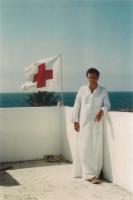Jürg Baumann was born on 22 June 1955 in Lausanne. After completing his secondary studies at a commercial high school, he went on to study business and economics at the University of Lausanne, completing his undergraduate degree in 1978. Jürg grew up speaking both French and Swiss German, and he became proficient in English through several one-month stints in the UK between 1971 and 1973.
At the University of Lausanne, Jürg served as president of the international economics and business students association. It was also during his university years that he was awarded the Robert Schuman Silver Medal for his efforts to promote European unification. He planned on a career in business, but not until after doing several years of humanitarian work. In addition to that altruistic instinct, he was driven by an interest in international affairs, a talent for organization and a preference for working under pressure in an unstructured environment.
When Jürg applied to the ICRC in December 1978, he was 23 years old. Although he had little work experience, he held the rank of lieutenant in the Swiss army and had completed some 500 days of military service. This had instilled in him a sense of discipline and the habit of living and working closely with others. In his recruitment interview with the ICRC, Jürg left an excellent impression: smart, confident and comfortable expressing himself. These same characteristics came through during his training course, together with a desire to be of help to his more experienced peers. He was enthusiastically hired despite being so young.
Jürg’s first mission provided him with eight months of on-the-job training in Israel and the occupied territories. He gained first-hand experience in visiting conflict-related detainees and helping reunite family members separated by the conflict. He was a fast learner and was able to hold his own in his interactions with the non-ICRC people and entities he came into contact with for his work.
After proving himself in that assignment, Jürg was posted to Sudan where the ICRC delegation was responding to the needs caused by significant unrest in neighbouring countries. He worked as a field delegate, spending much of his time in conflict zones where he became familiar with the challenges facing civilian victims and prisoners of war. Jürg’s reports were detailed and objective and reflected his sensitivity towards the people he was writing about and the situation they were in. As he gathered experience, he gained a greater appreciation for the perils of his line of work. One risk that is particularly hard to manage – that of chance – ultimately cost him his life. On 21 September 1980, one year into his second mission, Jürg was killed in a car accident. He was 25 years old.
Jürg was the embodiment of youthful idealism and responsibility, guided as much by his heart as by his head. When he joined the ICRC, he had more promise than practice, yet he turned that to his advantage, endearing himself to his colleagues through his eagerness and earnestness.
